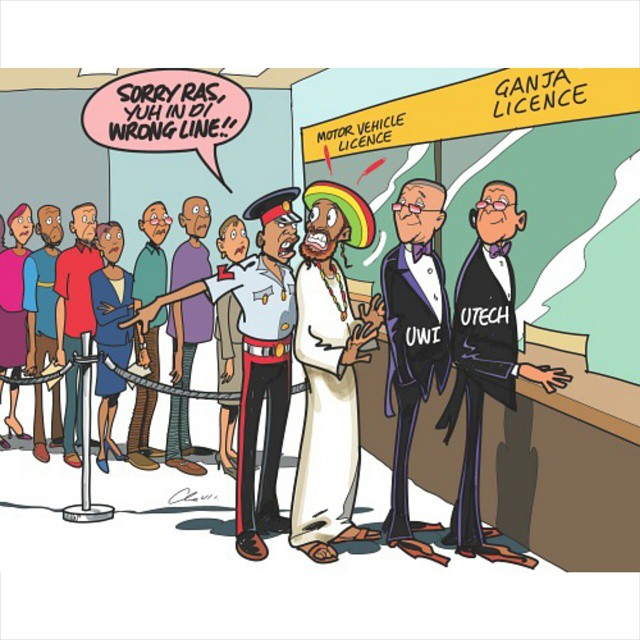From The Jamaica Observer, Clovis Toon, April 19, 2015
by Dr. Dominic Corva, Executive Director
Every day I find new assemblages for approaching the human-cannabis relationship. This cartoon is lifted from the Facebook group “The Coffee Model – Sensible Cannabis De-ILLegalization.” It’s an example of what we mean when we say discourses of cannabis legalization differentiate previously coherent notions of what it means to be legal, and what it can or should mean to be legal. In this case, our incipient class divides in the post-legal landscape enunciate a post-colonial problem, continuous with histories of imperialism, race and class in Jamaica.
Who gets to profit from “legal” cannabis, is the question. Privateer Holdings’ partnership with the Bob Marley family to create a global brand doesn’t happen in a vacuum. Laws have to be changed, and how they are changed will determine who gets to profit from ending the prohibition approach to cannabis regulation.
Profiting from prohibition’s end is different from benefitting from prohibition’s end, to be sure, and that’s the crux of the class warfare question. The singular common ground — prohibition’s end — is being broken up into a thousand loosely connected islands of relative policy liberalization, but we are still in general operating in the context of a Global Drug War.
Washington — and Colorado, and anywhere else concentrated financial capital is beginning to be able to infiltrate without fear of State intervention — provides the Privateers of the world footholds from which to leverage their financial power on behalf of ending absolute and punitive prohibition.
That’s positive. But instead of opening up possibilities for democratic human-cannabis relationships — the right to home grow, for example — the centralizing forces of financial capital may force those relationships into soulless, commodifiable choices brought to you by whoever has the most money to shape conditions for legalization.
That’s negative. But it’s also how the rest of our economy works: consumer rights to choose what brands they want to buy, rather than how humans want to relate to a plant, are the shield behind which transnational corporate financial interests advance the interests of a profoundly undemocratic economy.
Ending the drug war, it seems, has a price. This is the beginning of a conversation about that price, and whether there’s any room for non-financial value to speak. There’s lots of common ground to work on, but it’s time to stop pretending that the end of the drug war is the end of the conversation.
